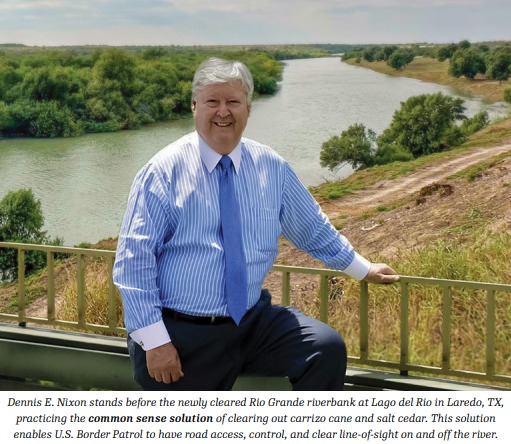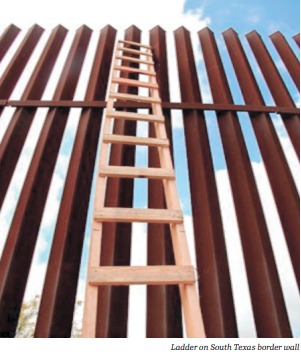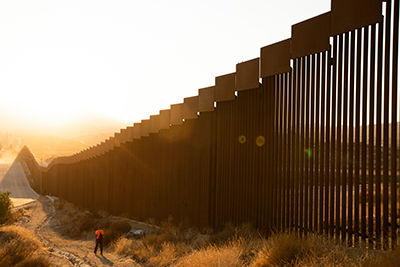Commonsense Border Management Solutions
 A newly updated white paper by Dennis E. Nixon, CEO, International Bank of Commerce Laredo, and Texas Chairman, International Bancshares Corporation, discusses the current state of the border and proposes effective and commonsense border management solutions including increased penalties for migrants who cross the border illegally. Nixon also highlights why work-based immigration is essential for U.S. economic growth due to slowing U.S. population growth and workforce shortages. In addition, he calls for the implementation of immigration and asylum policies that help to address America’s need for workers while improving border security, including hiring more immigration judges and reforming the immigration court and asylum systems to process migrants more efficiently.
A newly updated white paper by Dennis E. Nixon, CEO, International Bank of Commerce Laredo, and Texas Chairman, International Bancshares Corporation, discusses the current state of the border and proposes effective and commonsense border management solutions including increased penalties for migrants who cross the border illegally. Nixon also highlights why work-based immigration is essential for U.S. economic growth due to slowing U.S. population growth and workforce shortages. In addition, he calls for the implementation of immigration and asylum policies that help to address America’s need for workers while improving border security, including hiring more immigration judges and reforming the immigration court and asylum systems to process migrants more efficiently.
The full white paper can be viewed by clicking here.
Below is an executive summary of the commonsense border management solutions.
1. Send them back NOW!
Migrants must know that if they make a claim of asylum after illegally entering the United States, they will immediately be deported and won’t be allowed to re-enter the United States. CBP should only process ID’s for future identification, not for entry into the U.S. or for court dates. Migrants cannot afford losing their hard-earned dollars for the cost of a repeat trip. Social media will spread the word of immediate deportation thereby ending mass migration. Eliminate the profit motive and you destroy the economics of human smuggling.
2. Update our immigration and asylum laws.
The root cause of much of the border security problem lies in our outdated and ineffective laws. Immigration and asylum laws must be reformed to meet the workforce needs of the U.S. economy and provide the full range of workers needed to sustain U.S. economic growth. Approximately 90 percent of the migrants crossing the border without permission are economic migrants which is why we must reform the laws to stop the massive infow of people. If we amend the laws to provide an acceptable, legal path for immigration and asylum reform, we can stop the majority of migrants crossing without permission. We will then have a chance to regain control of the border and allow U.S. Border Patrol to stop illicit traffic. Right now, traffic is under the control of criminal elements that dominate the drug and human trafficking arena. We must remove the incentive for economic immigrants to cross without permission so we can focus on stopping the illicit trafficking of drugs and people. U.S. Border Patrol and affiliated government agencies are spending all their time processing and managing migrants on the border who simply want a better life and are crossing the border to achieve it. These migrants make a massive, positive contribution to our economy and mean no harm to anyone. Rather than processing economic migrants, U.S. Border Patrol should be spending their time apprehending the bad guys that make up less than 10% of all encounters. Congress, with cooperation from the White House, must act if we ever hope to have an impact on the migrant situation and secure the border. We cannot effectively secure the border without these necessary reforms. Additionally, cartels and criminals are making a fortune from immigrants attempting to enter the United States. Unless these laws are reformed, they will never stop. It’s all about the money.
3. Increase funding for immigration judges and establish an independent court system.
Apprehensions are only successful if there is an adequate immigration judicial system to handle the 1.8 million plus cases awaiting adjudication in the system. Funding for more immigration judges will help resolve a number of issues, including an ineffective catch-and-release program and inadequate migrant detention facilities. Immigration judges do not require Senate confirmation. They are appointed by the Department of Justice, so this is easily solved by increasing the budget to appoint new judges. The recent approval of 100 new judges will greatly advance this solution, but still falls short of the need. Furthermore, I believe an independent court system to adjudicate these cases faster should be established, thereby removing the courts from the Department of Justice.
 4. Clean up the Rio Grande River by eradicating and/or suppressing invasive plants such as carrizo cane and salt cedar in Texas – a plan supported by environmentalists – and create a linear park between Mexico and the U.S.
4. Clean up the Rio Grande River by eradicating and/or suppressing invasive plants such as carrizo cane and salt cedar in Texas – a plan supported by environmentalists – and create a linear park between Mexico and the U.S.
This recommendation makes the river a more effective security tool by greatly improving the U.S. Border Patrol’s visibility along the river, providing direct access to the riverbank, and reducing the risk of danger to U.S. Border Patrol agents by eliminating a hiding ground. At the same time, it would serve to conserve precious water (a mature salt cedar can consume 100 gallons of water per day); also, because carrizo cane is not a nesting ground for wildlife, no harm will occur to native species.
5. Encourage Mexico to implement a similar plan along the southern-side of the river, thus creating a wider buffer zone and improved sight line.
Mexican officials and border leaders have previously supported this effort, and recently developed a linear park in Piedras Negras which can be used as a model for a linear park in Laredo. The goal is to reintroduce this clean river plan to the current Mexican administration.
6. Build the Binational Laredo River Park Project in the downtown sector of Laredo/Nuevo Laredo.
This plan, drafted by the City of Laredo, Texas and Nuevo Laredo, Tamaulipas, Mexico, in coordination with local DHS officials would create a huge river ammenity between both countries in the central business district of each city, providing for improved quality of life and greatly enhancing border security. This park would act as a demonstration project for other locations along this river in addition to the clean river idea.
7. Complete the Cameron County Weir Dam Project in Brownsville, Texas and the Webb County Dam in Laredo, Texas to help widen the Rio Grande and build water reservoirs along the river.
It would increase border security, help aerate the water, enhance water quality, and expand the water supply - creating positive economic results while providing improved border security.
8. Improve and build road infrastructure along the Rio Grande River.
U.S. Highway 83 hugs the U.S. side of the river from Laredo to McAllen, but no such fully completed road exists along the river between Laredo and Eagle Pass. Completing Highway 1472/1021, AKA Mines / Las Minas Road would provide U.S. Border Patrol agents with much needed high speed access to the river, greatly improving response times. In order to provide access to the river, the 44 miles of Mines Road that is incomplete between Laredo and Eagle Pass should be paved.








